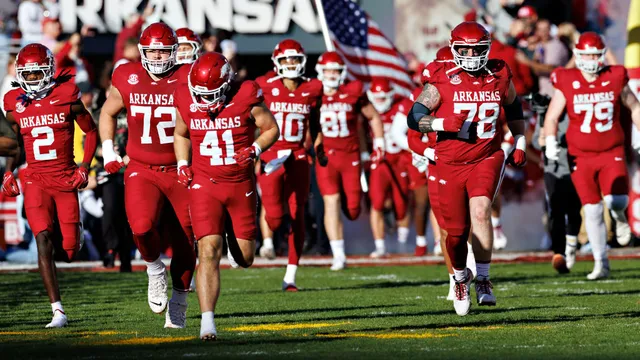
Nico Iamaleava leaves Tennessee for UCLA amid NIL dispute
2025-04-23 21:20- Nico Iamaleava announced his commitment to UCLA a week after being removed from the University of Tennessee team.
- His departure was influenced by tensions surrounding a renegotiation of his NIL deal, as he sought an increase in compensation.
- Iamaleava's transfer highlights the complications of current NIL agreements and player mobility in college sports.
Express your sentiment!
Insights
In recent developments, Nico Iamaleava, a quarterback who played for the University of Tennessee, announced his commitment to UCLA following a tumultuous period marked by issues surrounding name, image, and likeness (NIL) compensation. The announcement came on April 22, 2025, a week after Tennessee confirmed that Iamaleava would no longer be a part of the team due to his absence from practices and team meetings. Amidst rising tensions regarding a potential renegotiation of his NIL deal, which reportedly involved a request for an increase to $4 million, Iamaleava decided to enter the NCAA transfer portal with a do-not-contact tag. This led to speculation about his future. Iamaleava had been a significant player for Tennessee, leading the team to the College Football Playoff during the previous season, where he threw for 2,616 yards and 19 touchdowns. However, internal disputes regarding compensation hampered his relationship with the coaching staff, leading to his departure. Coach Josh Heupel acknowledged the situation as unfortunate but expressed appreciation for Iamaleava's contributions to the team. Following Iamaleava's announcement, his younger brother Madden Iamaleava also revealed intentions to enter the transfer portal. UCLA, fresh from a challenging season under first-year coach Deshaun Foster, saw Iamaleava's transfer as an opportunity to acquire a top-tier quarterback, especially after losing their previous starters. Tennessee's quick decision to seek a replacement was evident as they turned to former UCLA quarterback Joey Aguilar, marking a rare occurrence in college football where one team's loss resulted in another team's gain in a sequence of rapid transfers. This sequence highlights the rising impact of NIL negotiations on collegiate athletics and the changing landscape for players navigating their options in the transfer market. As the situation surrounding Iamaleava unfolds, it becomes clear that his departure is emblematic of the broader complexities athletes face within current college sports, where financial disputes can lead to significant shifts in team rosters. The implications of these decisions extend beyond individual players, as programs continue to adapt to an environment where NIL deals and player mobility are increasingly pivotal to recruiting and maintaining competitive advantage. The incident has garnered significant attention both for its unusual dynamics and the potential repercussions it might have on future player negotiations and transfers across the collegiate sports landscape.
Contexts
The introduction of Name, Image, and Likeness (NIL) deals has significantly transformed the landscape of college football, fostering a new era for student-athletes and educational institutions alike. Prior to the NIL policies, college athletes were unable to monetize their personal brands, exposing a gap in equity when compared to their non-athlete peers. Since the enactment of these policies, college football players can now engage in various endorsement deals, sponsorships, and personal appearances, which not only enhance their financial stability but also allow them more control over their personal branding. The economic implications of NIL agreements on college football are substantial. With the ability to earn income through their NIL, athletes are now incentivized to improve their performance and marketability. The competitive landscape has shifted as programs with greater resources can provide athletes with more lucrative opportunities. This leads to a potential increase in recruiting competitiveness, as players may choose schools based on the prospect of earning from endorsements. Moreover, it opens up new avenues for schools to engage with fans and boost team revenues through creative partnerships that promote both the athletic programs and the athletes themselves. However, the introduction of NIL deals has also raised concerns regarding equity and fairness among student-athletes. While high-profile players can attract significant deals, lesser-known athletes may struggle to gain similar opportunities. This disparity can lead to tensions within teams and create an unbalanced playing field, undermining the core values of college athletics, which emphasize teamwork and equal opportunity. Furthermore, the involvement of agents and external partners can complicate the dynamics of recruitment and athlete management, introducing additional layers of complexity that institutions must navigate. In conclusion, NIL deals have brought about groundbreaking changes in college football, offering student-athletes unprecedented opportunities for financial gain and personal development. As these deals continue to evolve, it will be essential for colleges and athletic departments to implement fair policies that promote equity among all athletes, ensure compliance with regulations, and maintain the integrity of college sports. The long-term impact of NIL deals will depend on how well these challenges are addressed, shaping the future of college football for years to come.